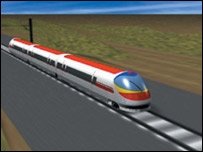
The announcement that South Africa’s government would spend in excess of R20 billion on its latest fancy – a designer train that will connect Johannesburg and Tshwane (formerly Pretoria) – has been received much like a bad joke at a stand-up show.
The reason for such extravagance is clear. South Africa had secured the questionable privilege of hosting the 2010 Soccer World Cup, and it desperately wants to look the part when the circus comes to town. If you will bear with him, Finance Minister Trevor Manuel has his own list of justifications:
“Gautrain is a turnkey project that will not only change the face of Gauteng but also increase the province’s competitive edge. It is a flagship public transport project of national significance that will result in the transformation of public transport. It will further contribute to meeting the objectives of government such as Broad-Based Black Economic Empowerment (BBBEE), small, medium and micro enterprise (SMME) development, empowerment of women, job creation, economic development and promotion of business tourism,” said Mr. Manuel, who minutes earlier had announced that the Gautrain would cost the country twice as much as expected.
Turnkey project? Contribute to the empowerment of women? Manuel does have a point buried beneath the mind-numbing political jargon; that the presence of a sleek, bendy, spaceship-like Gautrain will make South Africa seem closer to the first world country it aspires to be is incontestable. But what seems to bother everyone about the Gautrain is that it is an extravagance costly far beyond its price tag. A brief but discerning Q&A with a few civilians in Rosebank, an upper-class suburb in central Johannesburg at which the Gautrain will stop on its way to the CBD, reflected unanimous disgust at the project.
Mark, 56, said the whole thing was ‘a waste of time and money, not to mention a huge inconvenience on those of us who live in Rosebank.’ Jeremy, 26, an economist, was more sober but no less damning, saying ‘the amount they are spending on the Gautrain could have bought – and I’ve worked this out – new taxis for every taxi driver in the country, plus those drivers who don’t have licences could be issued one. If there was any change, we could move on to buses.’ A more mixed reaction from Zwelibanzi, 39, who concluded that ‘the idea is nice…to have a sexy looking train in time for the World Cup, but what are they going to do with the townships between here and Tshwane? Cover them up with big sheets during the tournament!’
There have already been unexpected costs, too. Just last year, construction group Murray & Roberts were reported to have lost R500 million while waiting for the government to agree on a number and sign the contract. Not only does this mean the project is likely to cost even more, but it means it’s less likely to be finished before 2010. And if that’s the case, I’m sure we’d all rather have had the new taxis.

Leave Your Comments